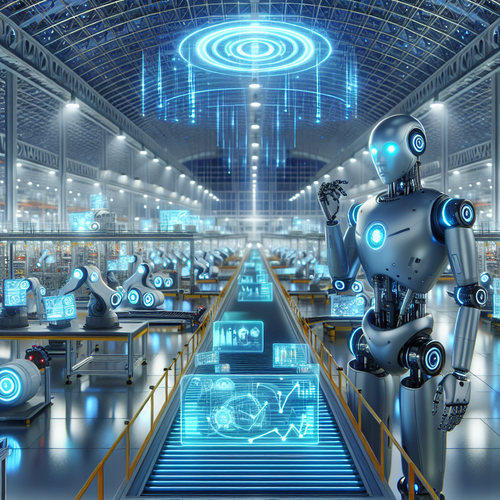
Harnessing the Power of AI in Smart Manufacturing
Harnessing the Power of AI in Smart Manufacturing
As we venture deeper into the 21st century, the manufacturing sector is undergoing a significant transformation. The integration of Artificial Intelligence (AI) within smart manufacturing is becoming a key driver for innovation, efficiency, and scalability. In this article, we explore how AI is revolutionizing manufacturing processes and what this means for the industry’s future.
The Shift Toward Smart Manufacturing
The term smart manufacturing refers to the use of advanced technologies, such as the Internet of Things (IoT), big data analytics, and AI, to streamline production processes. This approach allows manufacturers to achieve greater flexibility, adapt to market changes, and enhance overall productivity.
Key Benefits of AI in Manufacturing
- Increased Efficiency: AI algorithms can analyze vast amounts of data to identify bottlenecks in production and suggest optimizations in real-time.
- Predictive Maintenance: Utilizing machine learning, manufacturers can predict equipment failures before they happen, minimizing downtime and maintenance costs.
- Quality Control: AI-powered systems can detect defects in products during the manufacturing process, ensuring high-quality output and reducing waste.
- Supply Chain Optimization: AI helps in forecasting demand, optimizing inventory, and streamlining supply chain processes to ensure timely product availability.
Real-World Applications
Companies across various sectors are tapping into the potential of AI in smart manufacturing. For instance:
- Automotive Industry: Companies like Ford and BMW employ AI for optimizing assembly lines, thus reducing production time and costs.
- Aerospace: Boeing uses AI for predictive maintenance and enhancing the manufacturing process of complex aircraft parts.
- Consumer Electronics: Firms like Samsung utilize AI for quality control by analyzing images of products on production lines to detect defects automatically.
The Future of AI in Manufacturing
As AI technology continues to evolve, its role in the manufacturing sector will only grow. Industry experts predict a surge in the adoption of AI-driven solutions, leading to an era characterized by higher efficiency, lower production costs, and greater competitiveness.
Moreover, the ongoing expansion of the cloud computing infrastructure will facilitate the integration of AI in manufacturing systems, making it easier for companies to adopt advanced analytics and machine learning.
Challenges Ahead
Despite the promising benefits, the adoption of AI in manufacturing is not without challenges. Key concerns include:
- Data Privacy: Protecting sensitive information while integrating AI solutions.
- Workforce Displacement: Addressing the skill gap and training workers for AI-driven environments.
- Integration: Ensuring that new AI technologies seamlessly integrate with existing manufacturing systems.
Conclusion
The implementation of AI in smart manufacturing is not just a trendy buzzword; it represents a fundamental change in how products are made. By harnessing the power of AI, manufacturers can not only enhance operational efficiency but also secure their position in an increasingly competitive landscape.
To learn more about emerging technologies in the realm of manufacturing and how they can be leveraged, be sure to check out our post on The Rise of AI in Smart Home Technology.













